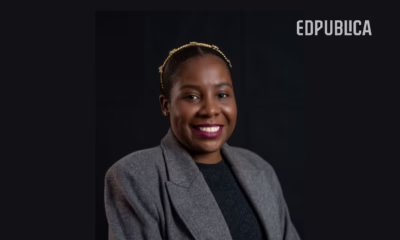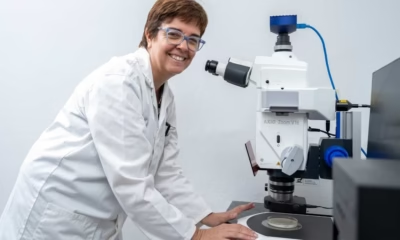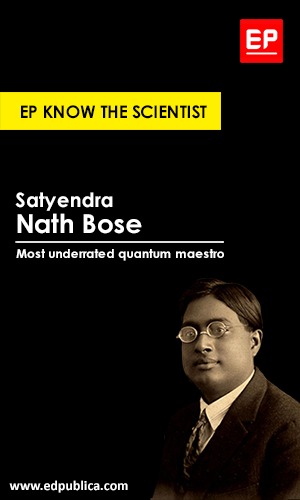EDUNEWS & VIEWS
UFS scientists recognized among the World’s Top 2% for 2024

Scientists from the University of the Free State (UFS) have earned global recognition for their research, with several faculty members named in the prestigious World’s Top 2% Scientists list for 2024. Compiled by Stanford University in partnership with Elsevier and based on data from Scopus, this list honours researchers whose work has made significant contributions to their fields and garnered worldwide recognition.
The ranking evaluates scientists using standardised citation metrics, including h-index, article citations, and other performance indicators, to identify the most influential scholars across various disciplines.
Prof Vasu Reddy, UFS Deputy Vice-Chancellor for Research and Internationalisation, expressed his pride in the achievement, stating: “The coveted Stanford-Elsevier list showcases top-notch scholars globally in the fields of science, engineering, business, public affairs, and the human sciences. We at the UFS are filled with pride and excitement to see our scholars who are making a positive mark in global research efforts.”
Top Performers from UFS
Prof Abdon Atangana, a leading researcher at the UFS Institute for Groundwater, is once again the highest-ranked UFS scientist on the list, securing the 391st position worldwide and 2nd out of 2,137 authors in Applied Mathematics. Prof Karl Peltzer, Research Fellow in the Department of Psychology, also earned recognition, ranking 4,806 globally and 47th among over 69,000 authors in Public Health.
Prof Reddy remarked, “The UFS is filled with immense inspiration and joy to celebrate our academics whose vision and dedication must serve as a true inspiration for all of us collectively at UFS. You are people, through your ideas and research, who drive real-world solutions to complex wicked problems and challenges.”
New Additions to the List
Several UFS researchers have made their debut on the prestigious list this year. These include Prof Felicity Burt, Principal Medical Scientist in Virology; Prof Yonas T Bahta, Professor in Agricultural Economics; Dr Andronicus Akinyelu, Lecturer in Computer Science and Informatics; Prof Abiodun A Ogundeji from the Disaster Management Training and Education Centre for Africa; and Dr Marieka Gryzenhout, Senior Lecturer in Genetics.
Dr Gryzenhout, who focuses on medicinal mushrooms, expressed her surprise at the recognition: “There are truly prolific and renowned researchers out there with impressive publication records and impactful research.” She attributed her success to impactful and relevant research, networking, and long-term citation of her work.
Notable Achievements and Contributions
Dr Anand Krishnan, Senior Lecturer in Chemical Pathology and a leader in nano diagnostic and therapeutic research, reflected on his inclusion in the list as a testament to his extensive contributions. “Being acknowledged in this elite group is a tremendous honour. It validates my commitment to advancing research in precision medicine and nano diagnostics,” he said. Dr Krishnan’s scholarly output includes over 127 published articles, eight books, and 22 book chapters, solidifying his reputation in global research.
Prof Yonas T Bahta, a National Research Foundation (NRF) C2-rated researcher, made his first appearance on the list, ranked 229,449 globally. “Being named in the Top 2% signifies global recognition for research excellence and enhances a scientist’s reputation within academia and industry,” he said. Prof Bahta’s research focuses on the social and economic impacts of water use behavior and agricultural drought in South Africa.
EDUNEWS & VIEWS
India’s Dhirubhai Ambani School Ranked Among Top Global Highschools
Founded in 2003, India’s Dhirubhai Ambani International School is also one of the youngest schools to feature in the rankings.
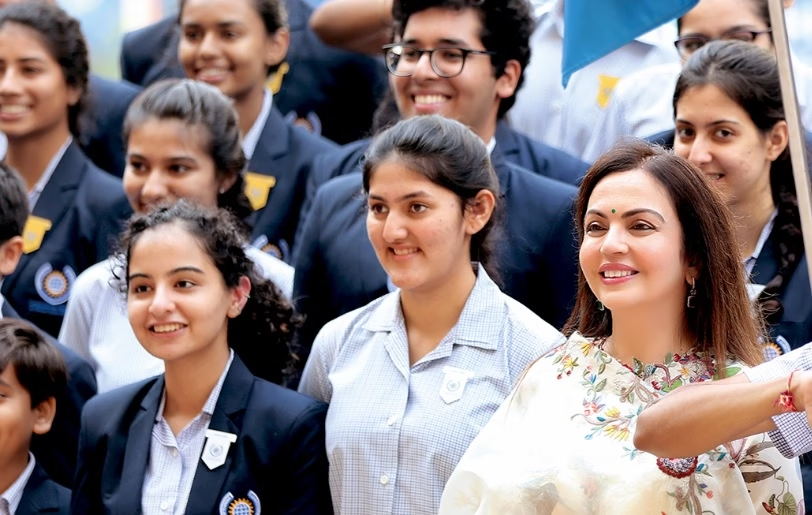
India’s Dhirubhai Ambani International School in Mumbai continues to shine on the global education stage, ranking fifth among schools outside the US and UK in the 2025 HSBC Hurun Education Global Highschools list. Founded in 2003, it is also one of the youngest schools to feature in the rankings.
The report emphasizes schools’ performance based on alumni university destinations, co-curricular development, and institutional reputation. With 190,000 students across the 180 ranked schools, only 0.6% of those listed are from India, underscoring the school’s elite standing.
In a media statement, Rupert Hoogewerf stated, “The list recognizes schools adding the most value to students’ futures. India’s presence through DAIS highlights the global competitiveness of select institutions in the country.”
Dhirubhai Ambani School joins a select group that includes Seoul International School, Chinese International School (HK), and Kolej Tuanku Ja’afar (Malaysia) in representing Asia outside China.
EDUNEWS & VIEWS
Global Highschool Rankings 2025: UK and US Dominate, China Rises
Among the standout institutions, Westminster School maintained its dominance with over 40% of graduates entering Oxbridge

In a global assessment of elite high schools, the HSBC Hurun Education Global High Schools 2025 report has named Westminster School in London as the world’s best high school for the third consecutive year. The annual ranking, now in its third edition, evaluates the top 180 independent schools across 11 countries based on university placements, co-curricular development, and institutional reputation.
The list reflects a shifting but still concentrated landscape of educational excellence. The United States and the United Kingdom together accounted for 85% of the world’s top highschools, with the US leading at 45% and the UK at 40%. However, China emerged as a strong contender, ranking third with 16 schools—up from 13 last year.
“The number of Chinese students studying abroad fell last year, but there are still nearly one million,” said Rupert Hoogewerf, Chairman and Chief Researcher of Hurun Education. “Interestingly, with 16 top-ranked highschools, Chinese families are finding viable options closer to home—avoiding time zone issues and maintaining cultural continuity.”
Among the standout institutions, Westminster School maintained its dominance with over 40% of graduates entering Oxbridge. St Paul’s School rose to second place, while The Dalton School in New York dropped to third. Notably, Winchester College returned to the top 10 and was named the world’s best boarding school, surpassing even Eton College and Phillips Andover.
“These rankings offer forward-looking insights for families planning their children’s international education,” said Kai Zhang, Head of International Wealth and Premier Banking, HSBC Asia, in a media statement. “Destinations like Hong Kong and Singapore are becoming increasingly attractive for their proximity and cultural alignment with Asian families.”
The report also revealed evolving trends in school environments and demographics:
>> 70% of the schools are co-educational, with a growing shift among historically boys-only UK schools admitting girls.
>> 51% offer boarding options, while half remain day schools.
>> The average school size was 1,050 students, with 140 graduating each year.
>> The average age of these schools is 204 years, with some—like King’s School, Canterbury—tracing roots back over a millennium.
Meanwhile, India’s Dhirubhai Ambani International School in Mumbai ranked 5th among schools outside the US and UK, continuing its position as a global outlier in quality private education from the subcontinent.
Despite steep tuition fees—averaging $63,000 annually for boarding schools—demand for places remains high. However, the UK’s recent addition of VAT on private school fees has prompted concerns, with schools like Winchester now costing over $80,000 per year.
Another key theme this year is the integration of creative thinking and AI literacy in education. “There is a real push toward STEAM, adding ‘Arts’ to STEM. Schools are under pressure to future-proof education and prepare students to thrive in the 2050s,” Hoogewerf added.
With data drawn from university destinations, co-curricular achievements, and alumni impact, the HSBC Hurun rankings offer more than a leaderboard—they reflect the evolving priorities and challenges in elite education worldwide.
EDUNEWS & VIEWS
Ambani Donates $18 Million to the Institute of Chemical Technology
Mukesh Ambani, who had chosen to study at ICT over IIT Bombay credited his professor with shaping his professional journey and inspiring the principles that led to Reliance’s growth

Mukesh Ambani, the country’s richest man, had announced a mammoth donation of $18 million to his alma mater, Mumbai’s Institute of Chemical Technology (ICT), on June 6.
Ambani, who is chairman and managing director at Reliance Industries, had been in attendance at a book launch event for Divine Scientist, a biography on Prof. Man Mohan Sharma, Ambani’s ex-teacher and cherished mentor.
Addressing a packed audience at ICT, Ambani said he was invested in ICT’s long-term growth and success in all fronts; advancing research, education, and ideals that Prof. Singh stood for, that is knowledge, sustainability, and nation-building. Sharma, who is professor in chemical engineering at ICT, had been the first engineer from India to be elected as a fellow of the Britain’s prestigious Royal Society.
“This is my Guru Dakshina (offering) [to Prof. Sharma],” Ambani said. Prof. Sharma has had a considerable influence upon him in shaping his professional journey, as well as principles, that led to Reliance’s growth.
In an anecdote he shared with the public, he said, “Prof. Sharma told me, ‘Mukesh, you have to do something big for ICT.’ I replied, ‘Sir, just tell me what to do.’ And he said, ‘Announce $18 million to ICT unconditionally.’ I’m very, very pleased to do that today.”
In the 1970s, Ambani was student at ICT, then known as the University Department of Chemical Technology (or UDCT). He had chosen ICT over an admissions offer at the prestigious Indian Institute of Technology, Bombay.
-

 Society4 months ago
Society4 months agoStarliner crew challenge rhetoric, says they were never “stranded”
-

 Space & Physics3 months ago
Space & Physics3 months agoCould dark energy be a trick played by time?
-
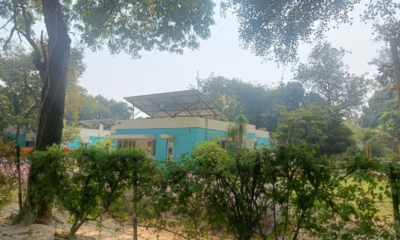
 Earth4 months ago
Earth4 months agoHow IIT Kanpur is Paving the Way for a Solar-Powered Future in India’s Energy Transition
-

 Space & Physics3 months ago
Space & Physics3 months agoSunita Williams aged less in space due to time dilation
-

 Learning & Teaching5 months ago
Learning & Teaching5 months agoCanine Cognitive Abilities: Memory, Intelligence, and Human Interaction
-

 Earth3 months ago
Earth3 months ago122 Forests, 3.2 Million Trees: How One Man Built the World’s Largest Miyawaki Forest
-

 Women In Science3 months ago
Women In Science3 months agoNeena Gupta: Shaping the Future of Algebraic Geometry
-

 Society5 months ago
Society5 months agoSustainable Farming: The Microgreens Model from Kerala, South India

